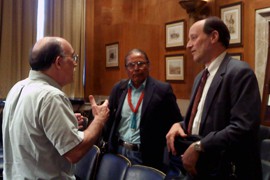- Slug: BC-CNS-Rights Fight,535
- Photo available (thumbnail, caption below)
By NICK NEWMAN
Cronkite News Service
WASHINGTON – For Arizona Native Americans Duane Yazzie and James Anaya, the need for the U.S. to stop marginalizing indigenous peoples and start listening has never been greater.
The men were among several who testified to Congress Thursday on the need to pass legislation that abides by the United Nations Declaration on Indigenous Peoples — passed in 2007 but only approved by the U.S. in December.
“Oftentimes, too many times, throughout our relationship, the federal government has decided it knows best what is proper for us,” said Yazzie, chairman for the Navajo Nation Human Rights Commission.
“We have always known what is best for us. We continue to know what is best for us,” said Yazzie, who said the “big-brother attitude” of the government has created gaps in U.S. policy.
The declaration recognizes the rights of native peoples to “self-determination, institutions, cultures and traditions,” while also barring discrimination against indigenous peoples. Only four countries – Australia, Canada, New Zealand and the U.S. – voted against the declaration in 2007 and the U.S. became the last nation to endorse it.
No opponents were present at Thursday’s oversight hearing of the Senate Indian Affairs Committee, which heard from nine speakers who urged the U.S. to embrace the declaration.
Anaya, the U.N. special rapporteur on the rights of indigenous peoples, said that while the declaration is non-binding, it should be a model for legislation on Native American rights in the United States.
The University of Arizona law professor said that just as the Supreme Court has “referred to other international sources to interpret statutes, constitutional norms, and legal doctrines,” courts should look to the declaration.
Anaya also said that following the declaration would let the U.S. continue the role as human-rights leader that began in 1948 when it led the fight for the Universal Declaration of Human Rights.
“Since then … it has been somewhat slow to take any kind of leadership role on indigenous peoples. The United States can and should now play that leadership role again,” he said.
Ryan Red Corn, an Osage filmmaker from Pawhuska, Okla., said there is a need for laws mirroring the declaration because of issues of national and tribal jurisdiction.
“If the state has jurisdiction over us, where are they when the drug dealers are in my neighborhood? Where are they when rapes are going unprosecuted?” Red Corn asked.
“I want to live in a time when human rights are not seen as a radical idea,” he said. “These are not extra rights, but they are basic human rights that everyone else has in the country.”
The most passionate witness was Yazzie. He cited disputes between developers and tribes over sacred tribal lands, for example, that threaten to contaminate soil and vegetation needed to perform ceremonies and prayers and could prevent a “Navajo traditional medicine person from treating his patient.”
He warned of negative environmental consequences if the U.N. declaration does not spur Native American-friendly legislation.
“We have something to say, something to offer. We believe we can help heal the Earth and provide hope for the future,” Yazzie said. “Western science is not enough. We must be at the table. It is our Earth, too, and it is our life, too.”
^ ___=
Web Links:
_ United Nations Declaration on Indigenous Peoples: http://www.un.org/esa/socdev/unpfii/en/drip.html
_ Senate Indian Affairs Committee webcast:
http://indian.senate.gov/hearings/hearing.cfm?hearingID=e655f9e2809e5476862f735da16ddd16
^ ___=

Navajo Nation Human Rights Commission Chairman Duane Yazzie (center) listens to Indian rights activists after a Senate hearing where Yazzie asked Congress to give Native Americans more autonomy to govern themselves.
(Photo by Nick Newman)